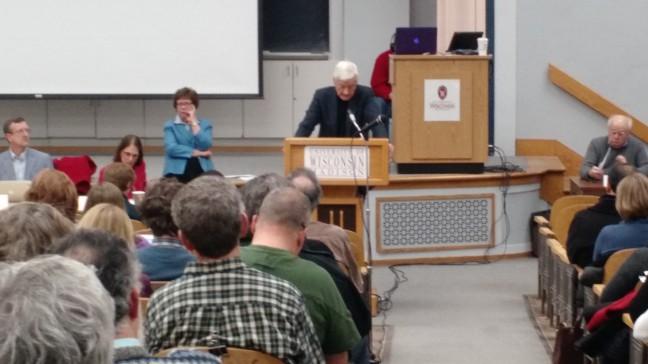University of Wisconsin Chancellor Rebecca Blank stressed the importance of being transparent with state legislators about what a recently announced $100 million gift will mean for UW at a Faculty Senate meeting Monday.
The gift from UW alumni John and Tashia Morgridge totals $100 million, and will be used to pay for employee salaries and research for faculty who are awarded a chair position, Blank said.
Blank said she was concerned legislators would approach UW faculty and ask why UW needs additional funding after the Morgridge gift was announced in November.
She stressed the money was not simply a blank check to spend as the university pleases, and will not replace funds from the state Legislature.
“We do not have $100 million to spend,” she said. “The [University of Wisconsin] Foundation received $100 million in endowment. None of that money can be spent until there is matching money from someone else.”
Making sure legislators know the UW doesn’t have an additional $100 million to spend at will is important as the state prepares its next biennial budget, Blank said.
Recently, state Rep. John Nygren, R-Marinette, who co-chairs the Legislature’s finance committee, called the University of Wisconsin System’s request for $95.2 million in additional support in the next biennial budget a “tough ask.”
Blank said UW will get 4.5 percent of the $100 million each year, which will then go toward “some combination of salary and research dollars for the faculty who receives the chair.”
The Faculty Senate also approved a reasonable accommodation policy proposed by the Disabilities and Accommodation Advisory Committee, bringing UW’s disability accommodation policies into compliance with the Americans with Disabilities Act.
The current procedures were developed in 1995 and have not seen major changes since, UW professsor Ivy Corfis, chair of the DAAC, said.
“Basically we wrote the whole document over again because there wasn’t much we could keep to try to bring us into compliance and do all the things we wanted to do,” she said.
One of the major changes to the policies include shifting more responsibility for handling confidential information to a divisional disability representative rather than department chairs.
The divisional disability representatives go through additional training on handling confidential medical documents.
“We really felt there needed to be a more professionalized model, where people who are trained in accommodations actually had some input and dealt with and led the process in the beginning,” Corfis said.
The new process will feel safer for faculty and remove some of the intimidation a lower-level employee might have when having to speak with a department chair, she said.
The changes were welcomed by faculty, some of whom spoke against the old policies, saying they were inadequate to handle disability accommodation requests.
“The current system was really broken, and really quite appalling, in the way that it worked,” said UW professor and DAAC member Ellen Samuels, who represents the Gender and Women’s Studies Department.
Correction: This post originally misspelled the Morgridge’s name in one instance. This post has been updated to reflect the change.


